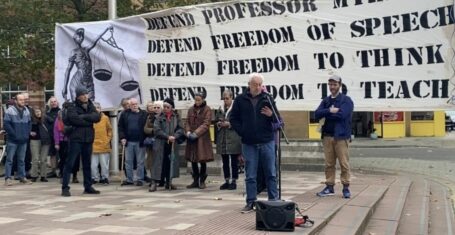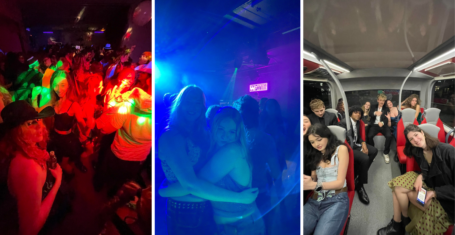
Meet the UoB students creating an online charity shop that helps battle fast fashion
‘We are trying to reconcile the mindset between the cost on the label and the true human cost of the clothes’
Everyone’s gone cold on fast fashion recently, with calls to boycott Boohoo and people calling brands out for leveraging the #girlboss image. Now, four Bristol Uni students are working hard to fill the gap by creating a non-profit, online charity shop.
Lily Jackson, Freya Cormack, Lizzie Bajin-Sharp and Martha Woods are the creators behind Wear It Right, a shop you can donate your dad’s old bucket hat or your old Fila windbreaker to instead of putting them on Depop. Your old garms are then uploaded on to an online shop where the profits go to the trade union for garment worker rights in Bangladesh.
Although set up like a charity shop, the girls pride themselves on the fact that you wont have to riffle through a bunch of old grandma dresses until you find something you like. Their collection will be carefully selected or reworked, so buyers can “look just as good as they would had they bought a new outfit” while “helping the people behind the sewing machines”.
The Bristol Tab spoke to the girls behind the shop, who believe the dire working conditions in Bangladesh and the environmental impacts of the garment factories “epitomise” the biggest issues in fast fashion which need your support.
‘Trade union membership is so key to helping the people behind the sewing machines’
Wear it Right aims to subsidise the cost of membership to the National Garment Worker Federation (NGWF) of Bangladesh which, Freya told us, do not have a lot of advocates in the western world: “I had heard whisperings about how Covid-19 had not been good for the fashion industry in regards to garment workers. The garment workers, especially in Bangladesh, just don’t have a lot of advocates in the western world.
“We are so wrapped up in our western consumerism that we forget about all the factors and the people who combine to make our clothes”
Wear It Right was initially just a concept for a graded uni assignment but, after extensive research and being in contact with the head of the NGWF, the students felt motivated and obliged to bring their idea to life and create something impactful.
The student’s explained that “the garment industry is central to the Bangladeshi economy, with garments making up 80.7% of exports. It is a popular site for international brands to set up production because poor health and safety conditions, low wages and long hours keep corporate costs low.”
Lily told us that the amount a worker has to pay to join the trade union is more than their monthly wage: “If people can’t join because they aren’t paid enough then it’s a vicious cycle. We are hoping our fundraising efforts can go towards subsidising the cost of membership and encourage more people to join.”
“Trade union membership is so key to helping the people behind the sewing machines.” Lizzie said.
‘They are the ones to suffer at our hands’
Fast fashion has a vast amount of consequences, but the dire situation in Bangladesh “epitomized” the impacts most important to the students; the environment and its ethics.
“Bangladesh is so overly industrialised that they are the ones suffering from air pollution and climate change.” Lily said.
“They are getting all the negative effects of the west as well as poor working conditions, so we thought Bangladesh epitomized both of the issues really well and we turned our focus there”
Freya also added, “Bangladesh have one of the lowest carbon footprints per capita, so it’s really sad that they are the ones to suffer at our hands”
Wear It Right are looking for students to sign up to be fashion volunteers to help with photography, modelling, pricing and editing photos.
“Fashion is a difficult industry to get into” Lily said, “but if you have people who are getting involved in some sort of environmental aspect of fashion then that is so useful for them if they are going in to the fashion industry later in life. If they have that experience of being conscious of fast fashion then we can keep that momentum going and impact the people who are going to be working within these companies in the future”
‘In Bristol there is such an eagerness to do better’
Lizzie said that the fashion scene of Bristol, already consisting of a lot of depop-ed and second hand clothes, shows that students care about the effects of fast fashion: “In Bristol there is such an eagerness to do better because the second hand fashion scene stands out for a lot of students. We just want to build on that because a lot of the students are already there.”
‘We are trying to change the industry and empower the workers’
We asked what makes Wear It Right different from just popping to the charity shops on Gloucester Road, to which they highlighted three elements; transparency, selectivity and focus.
“We are 100% transparent about where the funds are going. We are interested in fashion, we want to look good but also feel good about what we are doing at the same time. We can tell you exactly where the money is going to and where it’s coming from.” Lizzie told The Bristol Tab.
“We are also a little more selective. We still want people to look just as good as they would had they bought a new outfit from Missguided or PrettyLittleThing, but with the benefit of buying second hand, helping the environment and helping the workers.”
“There aren’t any charity shops with this focus. Nothing is looking at the cycle of clothing, and the people behind the machines.” Lily added.
Martha reinforced the dual focus on the environment: “The fact that it’s second-hand means we are working for the environment by avoiding clothes getting chucked into landfills. At the other end of the spectrum, we are trying to change the industry and empower the workers”
Wear It Right have also partnered up with UoB Fashion Forward Society, and are looking to collaborate with them this academic year. The Wear It Right team aim to “work with societies but keep our autonomy” as they “want to be out in the real world, and not restricted by uni”.
‘There is a person behind every single label on your clothes’
The politics students are looking to reshape the public mindset on buying sustainably and ethically, by triumphing that “buying sustainable does not mean buying expensive”.
Lizzie told The Bristol Tab: “We can all admit that we have been guilty of ignoring the plight of garment workers. The challenge is getting people to understand that even by donating a pound or donating clothes you are doing something so much bigger than just going to a charity shop.
“There is a person behind every single label on your clothes, which people don’t really want to think about. It’s our responsibility to advocate for change as much as we can as individuals and try to change that consumer mindset. We are trying to reconcile the mindset between the cost on the label and the true human cost of the clothes.”
If you fancy applying to be a fashion volunteer, click here
Follow The Bristol Tab FACEBOOK and INSTAGRAM for the latest updates
Related stories recommended by this writer:
• UoB freshers will have to live in a hotel for a month because their halls aren’t finished
• QUIZ: Which Bristol Uni halls do you really belong in?
• Bristol Uni sports teams banned from saying ‘let’s slim those waists’ by SU









































